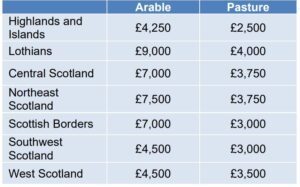Agribusiness News November 2023 – Sector Focus: Land Values
1 November 2023Consistent trends in demand
The patterns in the market for farmland from 2021 carried into 2022, as new buyer types contributed to a demand which continues to outpace supply. Again for 2023, farmers are still the main buyers in farmland, but the gap is being closed by new players which have entered the market in the past few years:
- Commercial forestry remains the chief driver of increasing land values, especially in areas with primarily non-arable agricultural land;
- Corporate, institutional, and ESG buyers are a driving force in the purchase of estates and upland holdings, especially peaty areas;
- Private investors and lifestyle buyers continue to play a role.
Several of these buyer types are crowding into the market due to the new asset class of natural capital. Urgent action is necessary to mitigate climate change and protect and restore Scotland’s natural environment. However, the Scottish Land Commission (SLC) and other voices are adamant that private investment in Scotland’s potential for carbon sequestration and biodiversity enhancement must not detract from land reform goals or the principles of a just transition to a net zero economy.
The wider economic conditions of 2023 are also a factor in the increased demand. Low interest rates and high inflation make land an attractive investment because it has historically provided a good hedge against inflation. Those investing for this reason have less immediate interest in carbon projects or other land use change, instead simply holding land as a financial asset.
Supply peaks in response
The current situation has been described as a ‘seller’s market’ due to the strong demand for all farm types. In response to this, 41,600 acres of farmland were marketed in Scotland in 2022, a 48% increase from 2021 and 30% higher than the 5-year average, marking a major shift from the constrained market of previous years. This figure does not account for off-market sales. These closed transactions played a lesser role in 2022 compared to 2021 but continue to make up a significant proportion of sales of smaller parcels of land. Nearly every farm (89%) which was put on the market in 2022 found a buyer by the end of the year.
Beyond the high prices currently being achieved for farmland, the uncertainty surrounding agricultural policy and the possibility of a change in government in 2024 have been cited as reasons that farmers are considering early retirement and exiting agriculture.
Prices and their effects
This increase in supply still does not meet the market’s demand, driving up prices for land across Scotland. Prices peaked at over £8,000 per acre for land suitable for forestry in early 2022, before falling back off later in the year. Prime arable land on the east coast fetched prices from between £4,500 per acre in the Highlands to £16,000 in the Lothians.
Table: Average 2022 prices for arable and pasture farmland by region (per acre). Source: Strutt & Parker Scottish farmland market review (Spring 2023).

Although other farming businesses are the most common purchasers of Scottish farms going up for sale, these buyers are most often large farms who are looking to expand their business or redirect profits from development land. In light of this, the current prevailing market trends seem to reinforce and perpetuate the pattern of concentrated landownership in Scotland. The prices and speed of many transactions have limited participation to a small number of well-resourced interests, drawing criticism from the SLC and others, who maintain that there needs to be policy intervention to safeguard opportunities for communities, family farms, local businesses, and new entrants to farming.
The New Entrant pages of the FAS website provide resources for those looking to start in the agricultural sector. Those interested in purchasing land are advised to monitor local newspapers, social media, land agent pages, and agricultural forums and groups. Alternative options to explore include seasonal lets, tenancies, joint ventures, contract farming, share farming, and business equity partnerships.
Brady Stevens, Brady.Stevens@sac.co.uk, 0131 603 7529
Sign up to the FAS newsletter
Receive updates on news, events and publications from Scotland’s Farm Advisory Service

